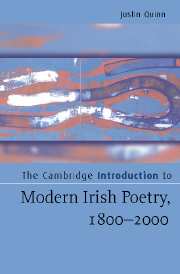Book contents
- Frontmatter
- Contents
- Acknowledgements
- Introduction
- 1 The appearance of Ireland
- 2 Tennyson's Ireland
- 3 Revival
- 4 W. B. Yeats
- 5 Wild earth
- 6 The ends of Modernism: Kinsella and Irish experiment
- 7 Ireland's Empire
- 8 Seamus Heaney
- 9 Irsko po Polsku: poetry and translation
- 10 Feminism and Irish poetry
- 11 Out of Ireland: Muldoon and other émigrés
- 12 The disappearance of Ireland
- Notes
- Guide to further reading
- Index
6 - The ends of Modernism: Kinsella and Irish experiment
Published online by Cambridge University Press: 05 June 2012
- Frontmatter
- Contents
- Acknowledgements
- Introduction
- 1 The appearance of Ireland
- 2 Tennyson's Ireland
- 3 Revival
- 4 W. B. Yeats
- 5 Wild earth
- 6 The ends of Modernism: Kinsella and Irish experiment
- 7 Ireland's Empire
- 8 Seamus Heaney
- 9 Irsko po Polsku: poetry and translation
- 10 Feminism and Irish poetry
- 11 Out of Ireland: Muldoon and other émigrés
- 12 The disappearance of Ireland
- Notes
- Guide to further reading
- Index
Summary
The publication of The Oxford Book of Modern Verse (1936) edited by W. B. Yeats seemed to provide official confirmation that Modernism in poetry had passed Ireland by. Although poets such as Ezra Pound and T. S. Eliot were represented in the book, they did not receive the coverage that their present reputations demand. Yeats had little understanding or sympathy for this new movement in poetry, which was radical in its formal experiments and more ambitious in its themes than much of the Georgian poetry in Britain at the beginning of the twentieth century. Yeats himself was able to bring traditional forms together with a thematic range to equal anything in Pound or Eliot, but while the Gaelic Revival released many disruptive forces into poetic idiom, in general Irish poetry in its aftermath was both thematically limited and formally conservative. Irish poetry in the mid century, then, reflects the depressed state of the culture, as well as the economic doldrums the country was going through.
The work of Denis Devlin does not upset this picture to a great degree, but it is an interesting exception, and, taken along with the work of Brian Coffey, shows the ways in which Irish poetry began to absorb the legacy of Eliot and Pound. Devlin was born in Scotland of Irish parents in 1908, and when he was twelve his family settled in Dublin, where his father ran a pub in which Michael Collins and his associates would often meet.
- Type
- Chapter
- Information
- The Cambridge Introduction to Modern Irish Poetry, 1800–2000 , pp. 97 - 112Publisher: Cambridge University PressPrint publication year: 2008



